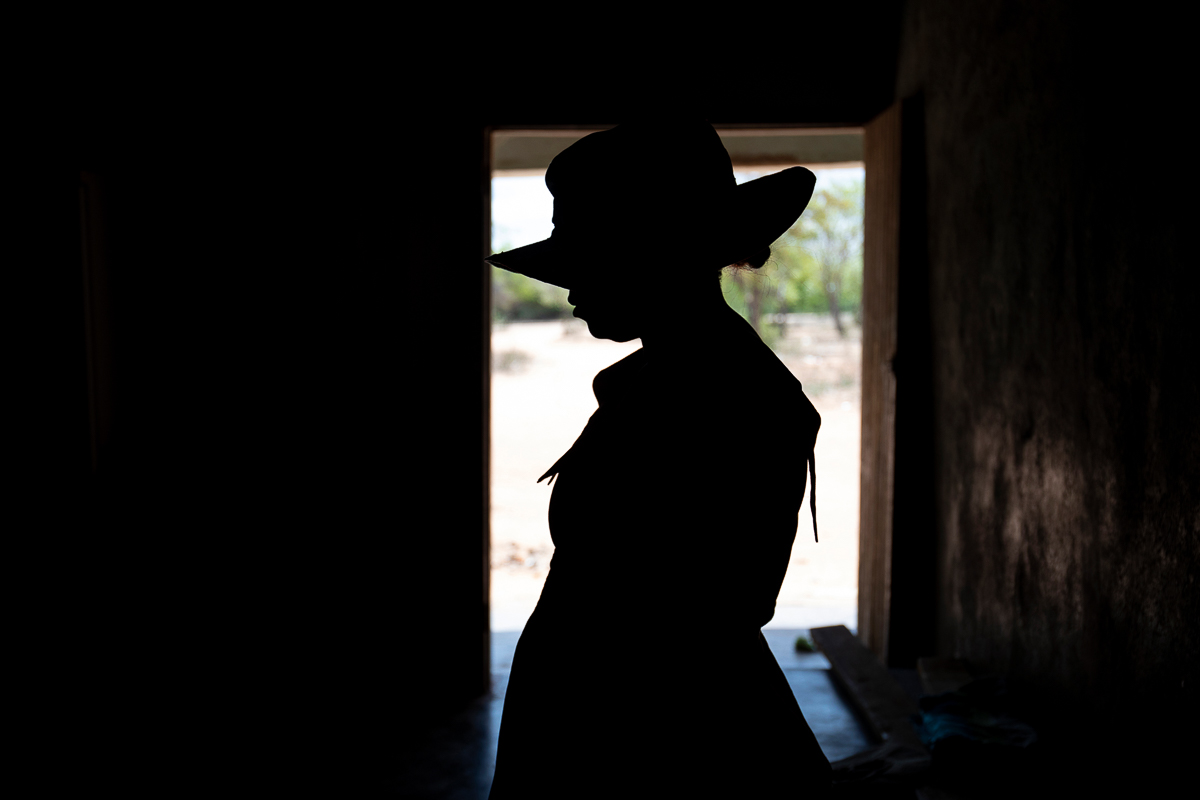Government turns a “blind eye” to religious sect’s child marriages
Tambudzai Moyo was just 16 when she was married to a 43-year-old member of the Johanne Marange Apostolic Church in Nyamadzawo village in eastern Zimbabwe. He already had two other wives, making Moyo, whose name has been changed to protect her identity, wife number three.
The Apostolic sect represents the largest religious group in the country and has some of the highest rates of child marriage among girls of any religious sect – even as Zimbabwe’s government is strengthening laws banning marriage for people under 18.
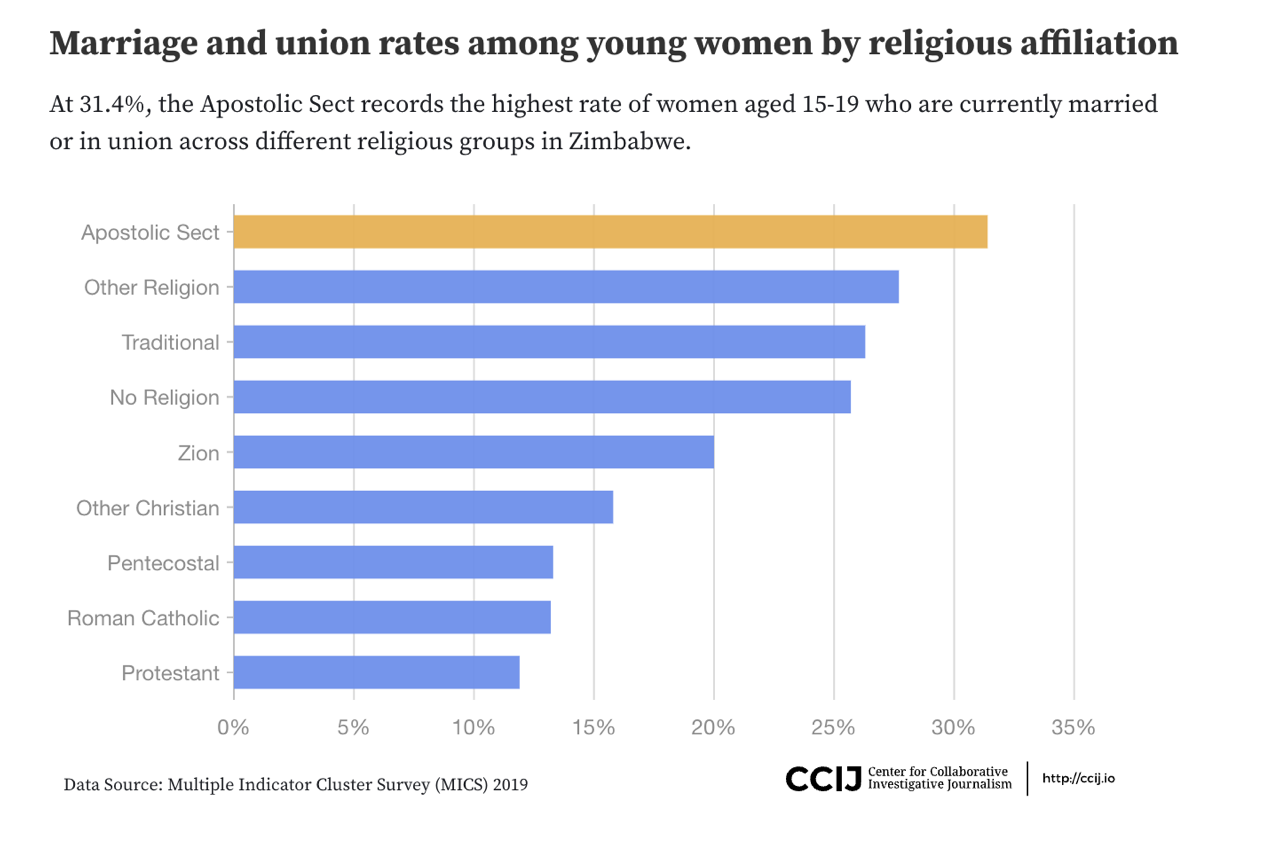
Despite these laws, and the country’s obligations under UN agreements, many of these marriages, performed under customary law and without official paperwork, are difficult to prevent. Many young girls, often in desperate circumstances, have no idea it is an illegal practice. Critics say that the Zimbabwean government has also been lax in preventing child marriages, while maintaining close ties to the church and its leaders.
CCIJ asked representatives of the government, the church, and the police to comment on this pattern. Justice Minister Ziyambi Ziyambi said the government is working to strengthen laws preventing child marriage, but added that the enforcement of those laws lies with the police. Abraham Mafararikwa, a baptist in the Johanne Marange Apostolic Church and a community leader, denied accusations that the church lacks seriousness in safeguarding the education of girls. He said Johanne Marange Apostolic Church has built many schools countrywide, showing that it prioritised education. And Assistant Commissioner Paul Nyathi, the national police spokesperson, said the problem is that some victims of child marriage do not make reports to the police, so they cannot pursue criminal cases.
Moyo, who is now 29, said she should have sensed there was something wrong. “When he courted me, he sent another man to convince me to marry him,” she said. “When I look back, I realise how strange the whole courtship was."
It happened shortly after her parents had died. As an orphan from Manicaland province, where rural children are more than twice as likely to be living in poverty as in urban areas, she was in a position many girls in her region may face: thinking the only way to survive Zimbabwe's volatile economy was to find a husband. But far from making things easier for her, the marriage plunged her into further anguish. “The men who practice polygamous marriage in the (Johanne Marange Apostolic) Church usually expect each wife to fend for herself,” she said. “So I would look for my own food and clothes.”
After she gave birth to her second child, local non-profit group Simukai Child Protection Program came to her rescue. The staff taught her how to sew clothes, mostly school uniforms. “When I had learned the skill and felt empowered enough to stand on my own, I then left the marriage,” she said. Moyo said she stopped going to the church three years ago.
Religion and politics
The Marange region of Manicaland is richly endowed with diamonds, but the rural communities face high rates of hunger and poverty. The church holds vast power in this area, where officials are members and publicly defend its practices, and many institutions – such as schools – are built by the religious sect. In interviews with villagers in the area, they seemed fearful to speak out.
That many government officials are aware these marriages are happening, is apparent from discussions on child marriage in Zimbabwe’s Parliament, which have named the Johanne Marange Apostolic Church directly. Officially, Zimbabwe – as a signatory to three international agreements that prohibit forced or child marriage (The Universal Declaration of Human Rights, The Convention on the Elimination of All Forms of Discrimination Against Women (CEDAW) and The Convention on the Rights of the Child) – wants the practice to stop. Already in 2014, as a result of a successful challenge filed by two women who had each been married as children, the Zimbabwean Constitutional Court deemed it in the public interest to expressly outlaw child marriage.
However, Zimbabwe failed to do so for another eight years. The Marriages Act [Chapter 5:15] banning child marriage was only signed by Zimbabwean President Emmerson Mnangagwa in 2022, after an investigation was conducted the previous year by Sithembiso Nyoni, the Minister of Women’s Affairs, Community, Small and Medium Enterprises, into the case of a 14-year-old girl who died while giving birth at an Apostolic church shrine in Marange.
Yet, even with a new law in place, reports of these marriages continue, particularly in relation to the Johanne Marange Apostolic Church.
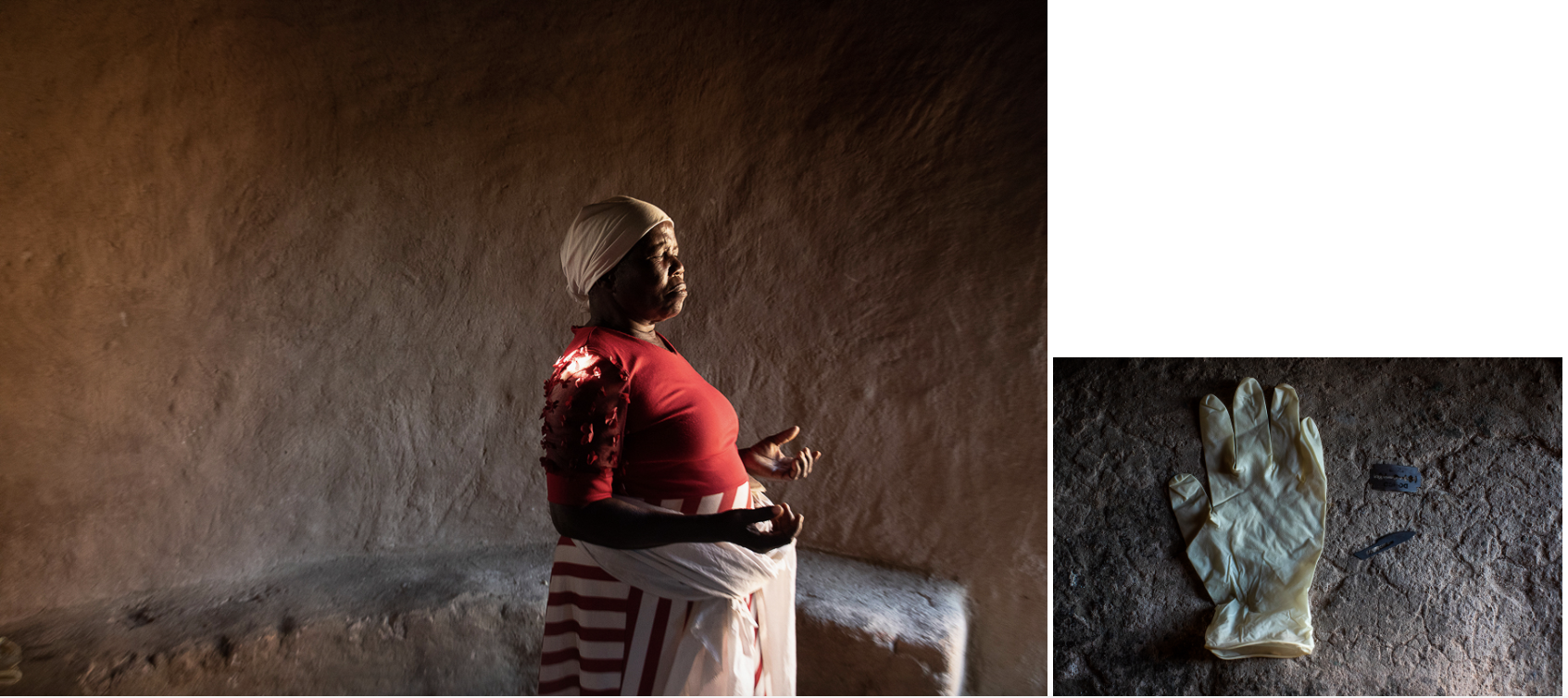
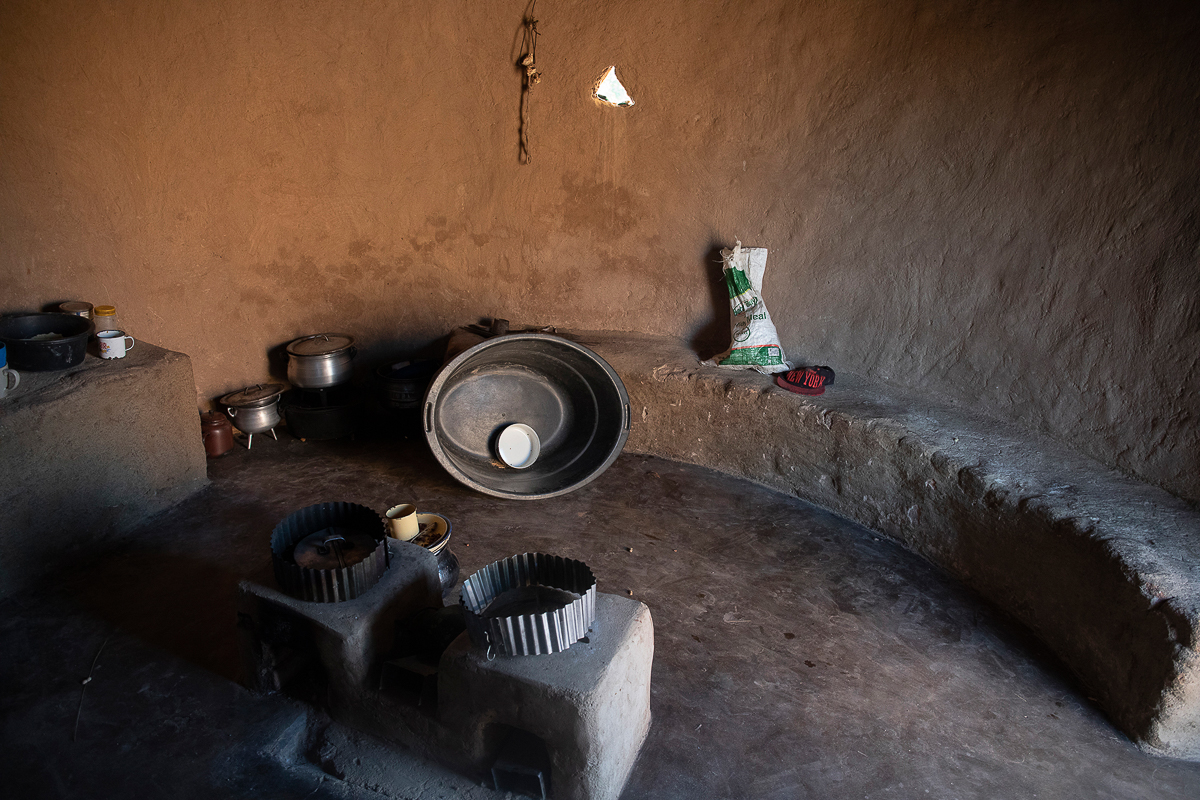
Tuition fees
One reason the practice persists is the ongoing challenge posed by Zimbabwe’s inflation and cost of living problem. In 2023, Zimbabwe recorded the highest food-price inflation in the world, according to the World Bank. A price surge hit the country, worsening a cost-of-living crisis that has left citizens hungry, children malnourished and families struggling for survival. As a result, children regularly drop out of school owing to a lack of money for tuition fees. Often, families choose to stop paying the fees for girls, who can marry in exchange for a bride price, while boys are more likely to drop out to start working.
Tracy Pangwe, 25, from Mafararikwa village, said she was repeatedly chased away from school for not having paid tuition fees, despite the Zimbabwean government’s messaging that no child should be turned away from school for non-payment of fees. Frustrated, in secondary school, Pangwe was eventually convinced to agree to an early child marriage. “A boy in Form 4 proposed love to me, and I accepted,” she said. “After he wrote his … exams, he sent his sisters to fetch me.” Much to her disappointment, her husband stopped supporting the family. They later divorced.
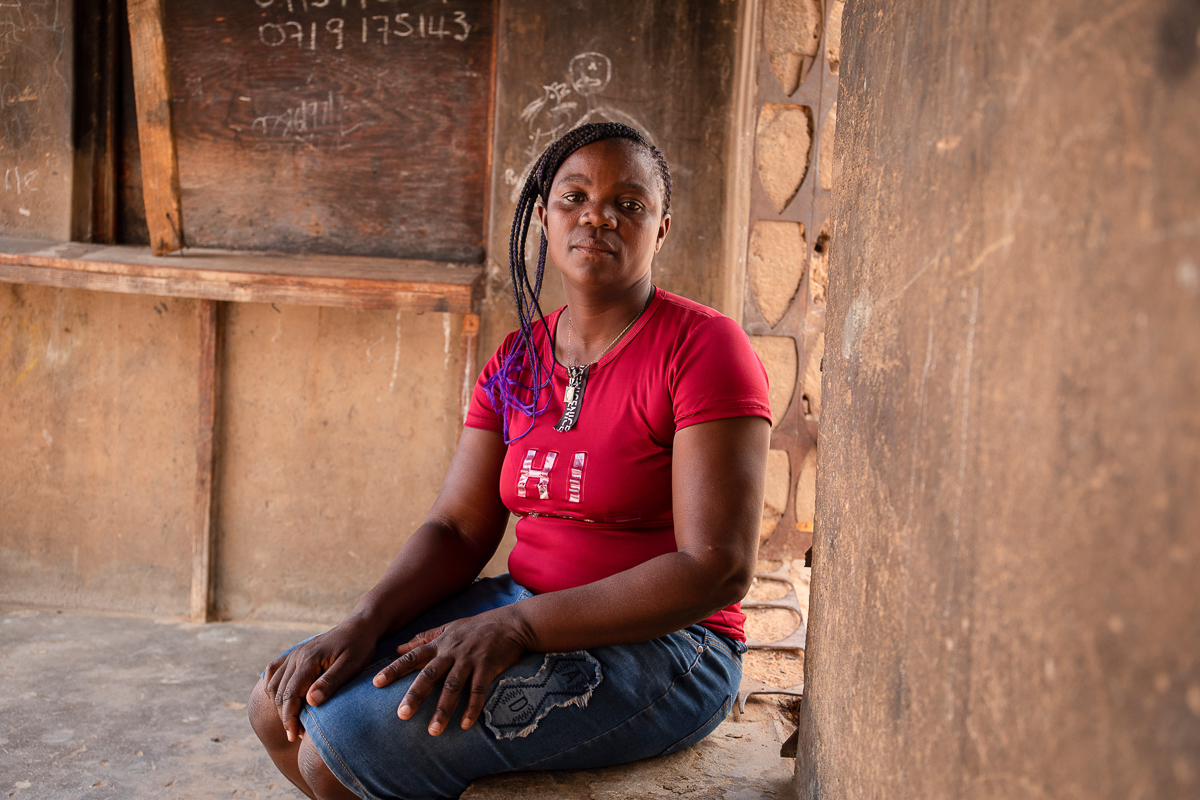
“It's traumatic for both the girls and the teachers”
Across the country, more than eight in ten girls of upper secondary school age (15 to 17 years old) in households led by members of the Apostolic sect are not attending school, according to the Multiple Indicator Cluster Survey conducted by the Zimbabwe National Statistics Agency. This represents the highest rate of non-attendance among all religious groups in the government survey. At one secondary school in Marange – which we cannot name to protect our sources’ identities – in 2023 alone, seven girls in Form 2, three in Form 3 and one in Form 4 got pregnant, according to a teacher. These girls were between 13 and 17 years old.
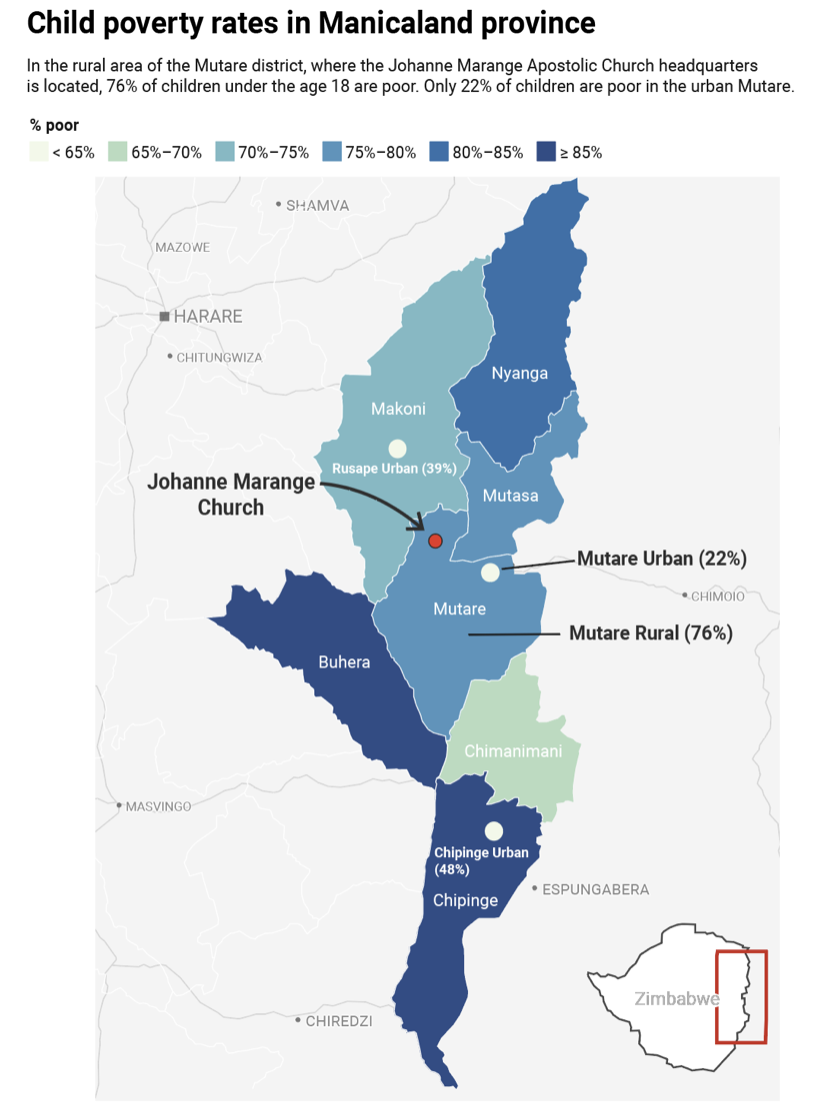
DATAVIZ MAP - Child poverty rates in Manicaland province
Poverty in the region contributes to this pattern, as many schoolgirls are lured by men into abandoning school, according to another teacher. “They use money to entice the girls, knowing fully well that these children come from poor families,” that teacher said. “Recently, a man based in South Africa came to marry a Form 2 girl. She is barely 15.”
The disparity between the promises of these marriages and the reality for the girls was repeated among each woman interviewed. They entered the marriage thinking it would provide financial support, but instead were faced with more challenges.
Another teacher said she and her colleagues felt their “hearts broken” when pupils get pregnant at the age of 13, 14 or 15. “Education is supposed to be their greatest instrument for breaking the cycle of abuse and poverty. (This is) traumatic for both the girls and the teachers.”
Untouchable
But another dynamic at the heart of the problem is the symbiotic relationship between the influential Johanne Marange Apostolic Church, ruling Zanu PF politicians, and the police. During election years, prominent Zanu PF politicians visit the church at the sprawling St. Noah mission in Mafararikwa and are even allowed to address congregants. The political elites – resplendent in the church’s trademark flowing, white robes – use these occasions as opportunities to garner popular support.
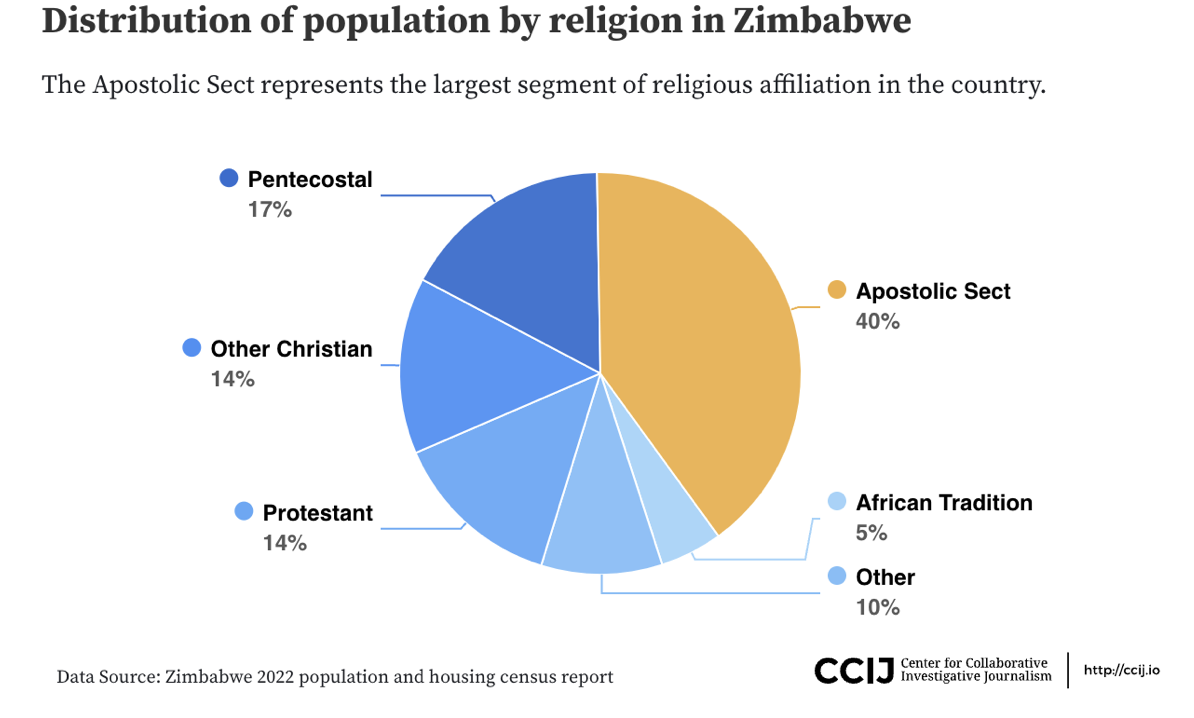
Around 40% of Zimbabwe’s population is part of the Apostolic sect, the largest religious group in the country. During each year’s Passover ceremonies, thousands of pilgrims come from across the country to celebrate together at the church headquarters in Marange. Last year, President Mnangagwa, Vice President Constantino Chiwenga, cabinet ministers, and senior government officials attended the church’s annual Passover services, according to photos and articles. These further included Oppah Muchinguri-Kashiri, the Zanu PF national chairman; Monica Mutsvangwa, Zimbabwe’s Minister of Information, Publicity and Broadcasting Services; and Sekai Nzenza, Minister of Industry and Commerce. Shortly after the appearances, church elders endorsed Mnangagwa’s repeat run for presidency.
Government officials, including Mnangagwa, also violated the government’s own public health rules by attending the Passover ceremony in July 2022. Moreover, in May of the same year, Mnangagwa paid a private visit to church leader Taguta’s family following the death of his father and predecessor, Noah Taguta. Earlier, during the COVID 19 pandemic, the church was able to contravene a nationwide travel ban.
The relationship is mutually beneficial”
Political commentators say the relationship between Mnangagwa’s ruling Zanu PF and the Apostolic sect is mutually beneficial. When the head of state visits, he often donates computers and other goods to the community. During and following these official visits, church elders often share their support for the sitting politicians. “The church elders tell the congregation that we, as a church, vote for the status quo. But that is really a big issue when you really scrutinise it,” said a local villager, who declined to give their name.
Several Marange community members told CCIJ that, due to the church’s power, the police are afraid or unwilling to hold church members to account for their crimes, and to investigate cases of child marriage involving church members. “A mother went to report a child marriage to the police, but nothing was done to bring the culprit to book,” one villager said, adding that the mother was told she’d gone to the wrong police desk and the case was abandoned. The villager said the community “believes the police were simply scared of investigating the church member.”
Twenty dollars
In the absence of action by the authorities, it remains up to individual community members to battle the scourge. Girls’ rights defender Sibongile Mukwananzi, 42, is hailed as a hero by many in her Marange community for her visits to households where a girl is at risk. Mukwananzi, who married a 26-year-old man at 16, fumes as she states that “the sad story is that the children of the Apostolic sect leaders are going to school, but the children of their followers are falling into this trap of early marriage.” She added that parents may even force a girl to be married as soon as they suspect her of being sexually active. But often, she says, it is a case of someone coming with as little as 20 dollars. “These men can just pitch up at your home (with a lobola of US$20) and announce that they have taken your child. Just like that!”
The US$20 figure was confirmed by three sources, who told CCIJ that girls as young as 12 have been married for a similar cost in transactions presided over by clan leaders. Mukwananzi said she doesn’t hesitate to barge into any home when she hears word of early child pregnancy. “I don't like child marriage. It ruined my life,” she said.
Denials
Abraham Mafararikwa, 57, is an influential patriarch who wears two hats: on one hand he is a baptist at the Johanne Marange Apostolic Church at the St. Noah mission, and on the other hand he is a sabhuku (village head). In rural Zimbabwe’s power matrix, sabhukus are powerful traditional leaders who head the village assembly and the village development committee. They exercise authority over family squabbles, land disputes, cultural infractions, and other troubles in the locality. Mafararikwa, who has 15 children, denied that the church encourages or enables men to marry underage girls, citing the example of his own daughters.
“People tell lies about our faith”
“My youngest daughter is 18 years old. I have four daughters who are married; none of them married below the age of 18,” he said, adding that the church works with community volunteers and local NGOs to advise youth to avoid child marriage.
“We have built 57 schools as the Johanne Marange Church, yet some people still say our church doesn't like education,” he said. The church’s spokesperson said in late 2023 the church has already built more than 30 schools across the country and intended to build a school in every district where the church has congregants. Zimbabwe has 64 districts. “People tell lies about our faith,” Mafararikwa said.
In response to a question about the church being untouchable due to a perception it enjoys protection from the ruling political party, Mafararikwa said the church’s leaders emphasize to its members that child marriage is illegal. “If a church member gets in trouble with the law over child marriage, we tell him to go and face the music,” he said. “Nobody is above the law.”
Contacted for comment, Justice Minister Ziyambi Ziyambi said the government is drafting new amendments to ensure the definition of a child in the Criminal Code is aligned with the constitutional definition, and that the new Marriage Act is also designed to close that gap. “We are trying to make sure we comply with the Constitutional Court judgment that said a child is somebody below the age of 18, yet our Criminal Code set it at 16,” Ziyambi said. “Due to this two-year age difference, these children were not enjoying the rights in the Constitution. That is what we’re trying to correct.” He also said that the enforcement of those laws lies with the police.
National police spokesperson, Assistant Commissioner Paul Nyathi, said, when asked, that some victims of child marriage do not make reports to the police, making it difficult to pursue criminal cases.
This report was produced by the Center for Collaborative Investigative Journalism (CCIJ), a non-profit organisation that brings together investigative reporters, visual storytellers, and data scientists to investigate key global issues affecting underserved communities. This investigation was produced with the support of the National Endowment for Democracy.

